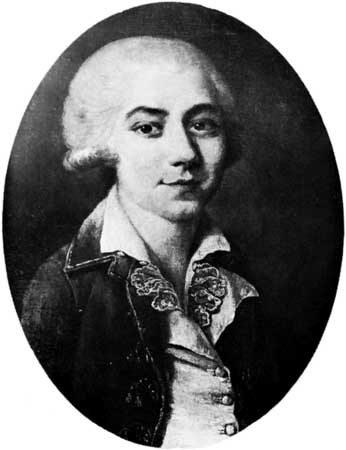Chénier, André de
French author
born Oct. 30, 1762, Istanbul
died July 25, 1794, Paris
 poet and political journalist, generally considered the greatest French poet of the 18th century. His work was scarcely published until 25 years after his death. When the first collected edition of Chénier's poetry appeared in 1819, it had an immediate success and was acclaimed not only by the poets of the Romantic movement but also by the anti-Romantic liberal press. Not only was Chénier's influence felt on poetic trends throughout the 19th century but the legend of his political struggle and heroic death—celebrated in Chateaubriand's work Le Génie du christianisme (1802), Sainte-Beuve's Joseph Delorme (1829), Vigny's Stello (1832), and Umberto Giordano's opera Andrea Chénier (1896)—also made him a European symbol of the poet-hero.
poet and political journalist, generally considered the greatest French poet of the 18th century. His work was scarcely published until 25 years after his death. When the first collected edition of Chénier's poetry appeared in 1819, it had an immediate success and was acclaimed not only by the poets of the Romantic movement but also by the anti-Romantic liberal press. Not only was Chénier's influence felt on poetic trends throughout the 19th century but the legend of his political struggle and heroic death—celebrated in Chateaubriand's work Le Génie du christianisme (1802), Sainte-Beuve's Joseph Delorme (1829), Vigny's Stello (1832), and Umberto Giordano's opera Andrea Chénier (1896)—also made him a European symbol of the poet-hero.His mother was Greek, and he always had a deep affection for Classical literature, in particular for elegiac poetry. He was educated in the progressive Collège de Navarre and, after an unsuccessful attempt at a military career in 1782–83, devoted himself for five years to study. In 1787 he reluctantly accepted a post in the French embassy in London. He was obsessed at that time by epic themes, notably a project for a poem on the New World, but he was psychologically inhibited from completing these works. His years in London were unhappy: he suffered from frustrated ambition and from self-doubt.
The Revolutionary upheavals in France in 1789 offered an opportunity to escape from this frustration. He returned to Paris and began to take an active part in political journalism, attacking the extremes both of monarchist reaction and of Revolutionary terror. Chénier was not a political innocent and realized the dangers of his position. At times he exposed himself unnecessarily, from the sense of moral integrity that is a fundamental theme of his work and perhaps also from an obscure hunger for self-destruction. In March 1794 he was arrested, imprisoned at Saint-Lazare, and, four months later, guillotined, a few days before the fall of the Revolutionary leader Maximilien Robespierre, an event that would have saved him.
Chénier's achievement was to have demonstrated how the qualities of the Greek lyrics could revitalize French poetry. In his works of the Revolutionary period, including poems that he smuggled out of prison in a laundry basket, he makes a passionate defense of ideals of liberty and justice: the Iambes, the last of which dates from very shortly before his execution, are a moving testimonial to the human spirit in the face of persecution.
- mansion
- Mansion House
- manslaughter
- Manson, Charles
- Manson, Sir Patrick
- Manstein, Erich von
- Mansôa
- Manta
- manta ray
- Mantegna, Andrea
- mantel
- Mantell, Gideon Algernon
- Manteuffel, Edwin, Freiherr (baron) von
- Manteuffel, Hasso, Freiherr von
- Manti
- manticore
- mantid
- Mantineia
- Mantiqueira Mountains
- mantispid
- mantis shrimp
- mantle
- Mantle, Mickey
- Manto
- mantra